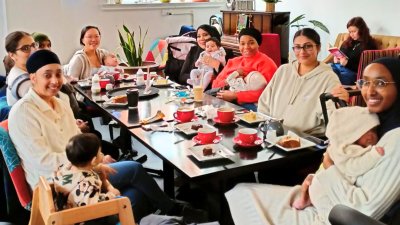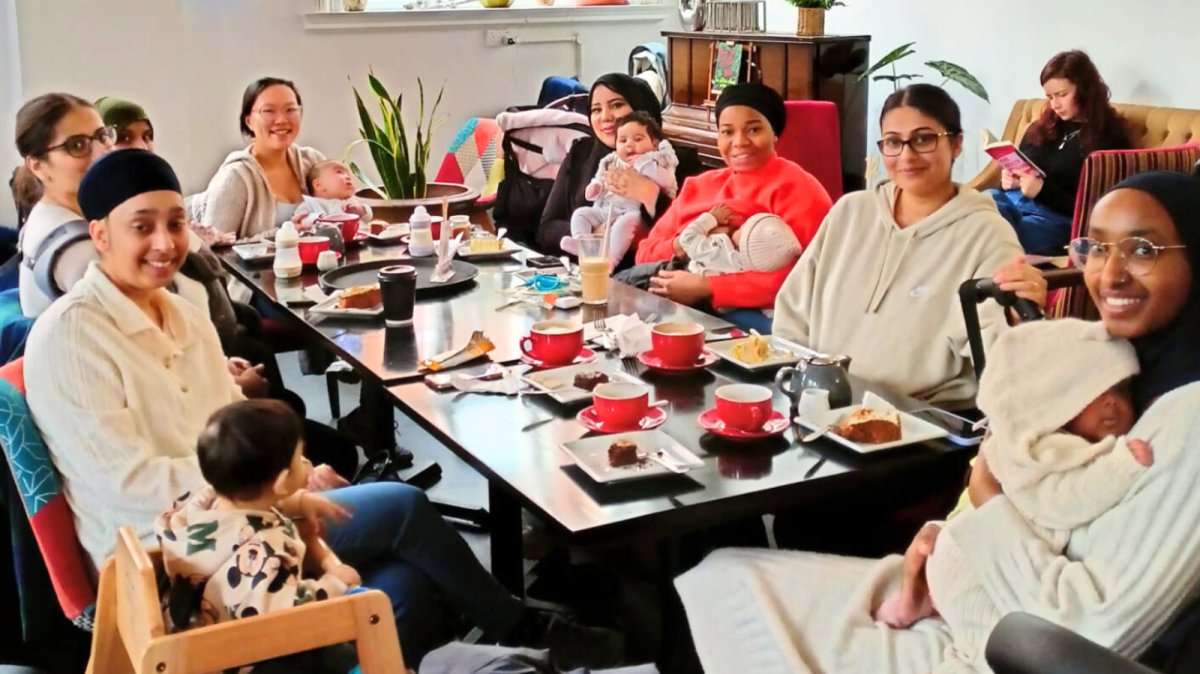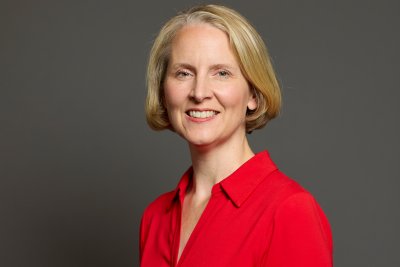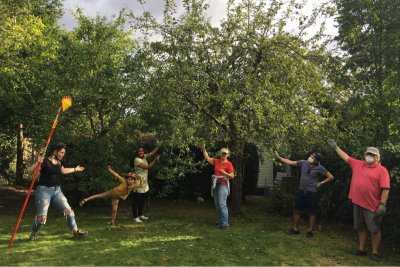 Leicester Mammas Telling our Tales cafe meetup. Credit: Leicester Mammas
Leicester Mammas Telling our Tales cafe meetup. Credit: Leicester Mammas

Making breastfeeding everyone's business
To celebrate #MothersDay 2025, Children's Food Campaign officer Naema Jannath talks with Leicester Mammas, and their campaigns for increasing breastfeeding support, better maternity rights, and tighter regulations on commercial baby food marketing.
Leicester Mammas is a small charity that works locally while also using their experience of supporting families to feed their babies to engage in national campaigning. They have fed into national advocacy for stronger marketing restrictions on breastmilk substitutes, and have also presented research on supporting food-insecure families with infant feeding to the APPG on Infant Feeding and Inequalities. Their work also includes media engagement and regular communication with local MPs. In practice, they provide non-judgmental support for breastfeeding and safe and appropriate formula feeding, and focus particularly on refugee and migrant families.
Following their Children's Food Award win at our 2025 Children's Food Summit, we were delighted to catch up with Sally Etheridge and the Leicester Mammas Team for an insightful discussion about breastfeeding and infant feeding policies.
NJ: Congratulations again on winning the ‘Championing Equality, Diversity & Inclusion in Children’s Food’ Award, what does it mean to you?
LM: “Our team is delighted and proud to have received the award for Equality, Diversity and Inclusion. Leicester Mammas has supported new mothers across the city with feeding their babies for over 15 years. Our Breastfeeding Supporters and Ambassadors speak many languages and represent the rich diversity of the city’s communities. The award is a fitting tribute to what we have built together as an organisation.”
Making breastfeeding & infant feeding more accessible.
NJ: Leicester Mammas is built around peer-to-peer support. Why is this model so effective in helping mothers with breastfeeding and infant feeding, especially in diverse communities?
LM: “Leicester is one of the most diverse cities in the UK, with high numbers of children living in poverty. This creates opportunities to celebrate our rich communities, alongside challenges in supporting families to give their children the best start. Mammas was founded in response to local need, initially as a Breastfeeding Peer Support Programme for South Asian Muslim mothers in Highfields Leicester. From the start, we chose to support all mothers, however they were feeding their baby, from antenatally until their child was two or older.
Our staff and volunteers are mothers who have breastfed their own babies, often overcoming significant barriers. They understand the early challenges, pressures, and expectations that can hinder breastfeeding. As part of the community, we learn from one another. For new mothers seeking support, it’s like having a skilled, non-judgmental friend by your side, offering information and encouragement for as long as you need it.
Our Baby Cafés run throughout the week in seven locations, supported by our helplines and WhatsApp groups. We also offer home visits where capacity allows. Women who have accessed our support can join our Mammas Ambassador course, learning about breastfeeding and the wider social landscape that shapes parents’ feeding experiences. Breastfeeding is everyone’s business. Our Peer Supporter volunteers, who complete both the Ambassador course and Peer Support training, continue the circle of support by volunteering in groups and on helplines.
We collaborate with the NHS, UHL, Public Health, and Leicester City Council to ensure families receive up-to-date, evidence-based support during the First 1000 Days, from pregnancy to two years.”
Policy Gaps in Breastfeeding & Infant Feeding
NJ: What do you see as the biggest policy gaps in breastfeeding and infant feeding support in the UK today, and how do they impact the mothers you work with?
LM: “Lack of investment in breastfeeding support makes it a postcode lottery as to whether families get trained, timely help. We need universal breastfeeding support with recruitment/training of skilled staff in all the health and care professions that encounter families in the perinatal period so we can strengthen the warm chain of breastfeeding support that’s needed.
We need to ban all advertising of breastmilk substitutes, including product placement in social media, and promotion of stage 2,3, and toddler milks. We have a long way to go in this country for breastfeeding to be seen as the normal, natural way of feeding babies and the stream of clever marketing from companies constantly undermines this, encouraging desperate parents to reach for formula at the first hurdle.
We need better maternity protection for all women, including those who are in the UK as international students, or on health-care worker or skilled worker visas or are refugees and asylum seekers. Many women our Baby Project supports have no recourse to public funds, and some find themselves indebted to the NHS by several thousands of pounds for the maternity care they received, whilst desperately trying to make ends meet. This is an unfair and inequitable situation which we must challenge.
It is a sad fact that the poorest women, facing the greatest challenges, are too often those who are least likely to start and continue to breastfeed. Numerous appointments, lack of access to antenatal classes, not knowing the system in this country, poor access to health facilities, and much more, lead to poorer outcomes following birth and time to initiate breastfeeding effectively.”
Accessing healthier foods
NJ: What challenges do mothers face when it comes to accessing healthier solid foods for their infants, and how can policy changes help improve the availability of nutritious options for families?
LM: “Many families assume that proprietary and processed baby foods are healthy, carefully thought-through, scientific products, that are made by companies who have the needs of babies at the heart of their business model – they cannot imagine that it would be ‘allowed’ for companies to put profits ahead of babies’ health – or that the government would not be carefully regulating marketing. Parents trust those in positions of power to look out for their child’s health – and why wouldn’t they think this?
There is also a strong element of family/cultural practice too, that companies take advantage of. Foods such as Farley’s Rusks and Cerelac, which are very high in sugars and have low nutritional value, are still widely used, in the belief that these are good for babies. We need the government to tighten the regulations on ultra-processed foods that are marketed for the consumption of babies (some with labels stating they are suitable from 4 months, which goes against NHS guidelines). This would mean accurate labelling, reducing the sugar content, and the use of other cheap and sweet fillers such as fruit juices and purees, maltodextrin etc. There are significant adverse consequences of these foods forming a significant part of the diet of young children, from tooth erosion and fussiness with accepting more complex tastes and textures to speech delays and deficits in vital nutrients.
We also need to ensure families struggling with financial hardship can source fruit and vegetables and have access to cooking facilities- something that many of our families living in poverty or in temporary accommodation simply do not have, forcing them to rely on calorie dense packaged foods and snacks.”
NJ: You recently attended the Children’s Food Campaign summit in London, what did you take away from that event?
LM: “It was refreshing to find ourselves in a room full of people who truly got it, to celebrate together and feel the solidarity, warmth and energy of so many passionate individuals working in their own capacity or within organisations to create meaningful change for our children’s health. We enjoyed the Yucky awards almost as much as the Yummy ones- it was gratifying to see the worst offending brands being called out on their misleading marketing and false claims about their products.”
A message to the government on Mother’s Day
Leicester Mammas asked their Mammas Ambassadors and Peer Supporters to share what they would say. Nearly everyone spoke about the need to improve Maternity Rights, especially to support breastfeeding for women returning to work.
"The UK is one of the only countries across the world that does not give paid breastfeeding breaks – many other countries have paid breaks up to three years for breastfeeding, which would support the WHO recommendations to breastfeed for two years and beyond.
Others mentioned the low rate of maternity pay, and mentioned other European countries including Romania and Lithuania, that give far more generous length and rates of maternity pay. There was also lots of mention of the need for longer paternity leave.”
A message to all mammas on Mother’s Day
NJ: What message would you like to share with mothers this Mother’s Day, particularly those navigating the challenges of infant feeding?
LM: Mammas Ambassadors and Peer Supporters say:
“You are doing better than you think you are”
“To all the mums out there, you are doing an amazing job. It’s not always easy”
“Keep going, it’s hard, but it gets easier and it is so worth it”
Find out more about Leicester Mammas.
More useful information about safe, healthy breastfeeding and infant formula feeding is also available from Sustain member organisations First Steps Nutrition Trust and Baby Milk Action.
Children's Food Campaign: Campaigning for policy changes so that all children can easily eat sustainable and healthy food.
Sustain
The Green House
244-254 Cambridge Heath Road
London E2 9DA
020 3559 6777
sustain@sustainweb.org
Sustain advocates food and agriculture policies and practices that enhance the health and welfare of people and animals, improve the working and living environment, promote equity and enrich society and culture.
© Sustain 2026
Registered charity (no. 1018643)
Data privacy & cookies
Icons by Icons8







